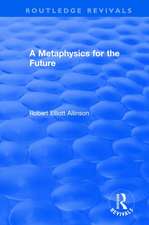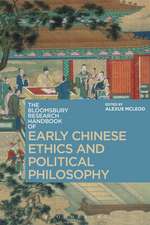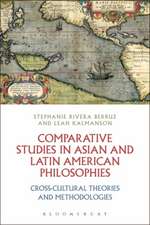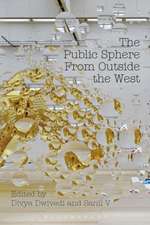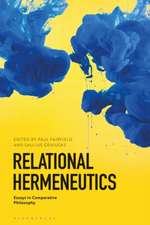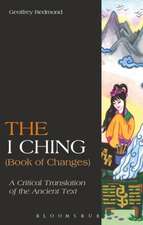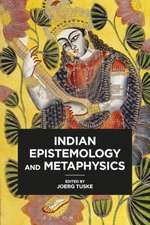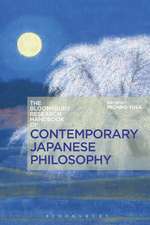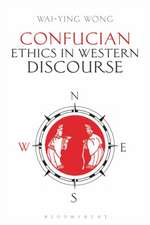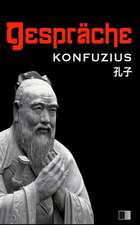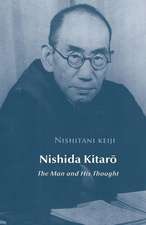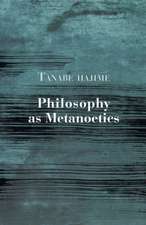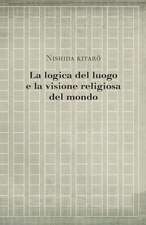The Philosophical Influences of Mao Zedong: Notations, Reflections and Insights
Autor Robert Elliott Allinsonen Limba Engleză Paperback – 18 sep 2019
| Toate formatele și edițiile | Preț | Express |
|---|---|---|
| Paperback (1) | 167.24 lei 3-5 săpt. | |
| Bloomsbury Publishing – 18 sep 2019 | 167.24 lei 3-5 săpt. | |
| Hardback (1) | 498.56 lei 6-8 săpt. | |
| Bloomsbury Publishing – 18 sep 2019 | 498.56 lei 6-8 săpt. |
Preț: 167.24 lei
Preț vechi: 193.27 lei
-13% Nou
Puncte Express: 251
Preț estimativ în valută:
32.01€ • 33.06$ • 26.64£
32.01€ • 33.06$ • 26.64£
Carte disponibilă
Livrare economică 04-18 martie
Preluare comenzi: 021 569.72.76
Specificații
ISBN-13: 9781350059856
ISBN-10: 1350059854
Pagini: 256
Dimensiuni: 156 x 234 x 25 mm
Greutate: 0.41 kg
Editura: Bloomsbury Publishing
Colecția Bloomsbury Academic
Locul publicării:London, United Kingdom
ISBN-10: 1350059854
Pagini: 256
Dimensiuni: 156 x 234 x 25 mm
Greutate: 0.41 kg
Editura: Bloomsbury Publishing
Colecția Bloomsbury Academic
Locul publicării:London, United Kingdom
Caracteristici
Examines how Mao's reading of Western and Chinese philosophy contributes to the reconstruction of Confucianism in China today
Notă biografică
Robert Elliott Allinson is Professor of Philosophy at Soka University of America, USA and former Professor at The Chinese University of Hong Kong, Hong Kong.
Cuprins
Foreword, Irene Eber, Louis Frieberg Professor Emerita of Chinese History and Philosophy and Senior Fellow, Harry S. Truman Research Institute for the Advancement of Peace, Hebrew University of Jerusalem, IsraelPrefaceAcknowledgements1. Introduction to the Philosophical Mao2. Mao's Youthful Philosophical Development3. Mao in the Margins: Mao's Philosophy of Egoism4. Mao's Early Philosophical Influences and Reflections5. The Blend of the Influence of Chinese and Western philosophy on Mao's Thought and Parallels in China's Social and Economic Development6. Mao's Marxist Thought and the Yijing7. Mao as Metaphysician and Literatus8. Mao's Contributions to PhilosophyNotesSelected List of ReferencesIndex
Recenzii
Mao Ze Dong is celebrated (or cursed) as a revolutionary leader, but the philosophical foundation of his activity is largely ignored. In his superb study, Allinson fills in this lack. Mao's thought is not just located in its historical context; its complex references to the Chinese traditional thought, to Marx and Western philosophy, but also to modern sciences (quantum physics), are explored and documented. A new Mao thus emerges, a Mao whose radical acts are grounded in a thick texture of philosophical reflections. Allinson's Mao is indispensable for everybody who wants to understand not just Mao but the concatenation of philosophy and politics that characterized the twentieth century.
Through extensive research, involving not only Mao's writings themselves but also the marginal notes he made on books he read, Allinson is able to trace the development of Mao's thinking over the course of his lifetime and to demonstrate the degree to which he was actively engaged with both the Chinese and Western philosophical traditions throughout. This is an invaluable contribution to our understanding of the intellectual history of China.
Has it ever occurred to you to associate Mao with Aristotle or with the ancient Chinese Book of Changes, the Yijing? If you find it hard to believe, read this book by Robert Allinson who, in his own philosophical way, manages to inject new life and revived interest in this highly controversial but iconic figure which is still looming large behind the giant video screen of present day China.
This is a most exciting and fascinating enterprise. A magnificent statement on behalf of East-West philosophy.
As Irene Eber writes in her foreword to this book, "This is a ground breaking work". She is right, for it is indeed a work of utmost importance. In addition, the book is essential because it deals with a highly topical issue, one that can certainly help us to improve our understanding of contemporary China . . . Allinson achieves his goals in this book by clearly demonstrating a thoughtfully elaborated case of a truly intercultural, and, at the same time, truly intersubjective philosophy with widely influential connotations. This volume will be of great value to anyone interested in Chinese or cross-cultural philosophy, political theory and recent history.
Through extensive research, involving not only Mao's writings themselves but also the marginal notes he made on books he read, Allinson is able to trace the development of Mao's thinking over the course of his lifetime and to demonstrate the degree to which he was actively engaged with both the Chinese and Western philosophical traditions throughout. This is an invaluable contribution to our understanding of the intellectual history of China.
Has it ever occurred to you to associate Mao with Aristotle or with the ancient Chinese Book of Changes, the Yijing? If you find it hard to believe, read this book by Robert Allinson who, in his own philosophical way, manages to inject new life and revived interest in this highly controversial but iconic figure which is still looming large behind the giant video screen of present day China.
This is a most exciting and fascinating enterprise. A magnificent statement on behalf of East-West philosophy.
As Irene Eber writes in her foreword to this book, "This is a ground breaking work". She is right, for it is indeed a work of utmost importance. In addition, the book is essential because it deals with a highly topical issue, one that can certainly help us to improve our understanding of contemporary China . . . Allinson achieves his goals in this book by clearly demonstrating a thoughtfully elaborated case of a truly intercultural, and, at the same time, truly intersubjective philosophy with widely influential connotations. This volume will be of great value to anyone interested in Chinese or cross-cultural philosophy, political theory and recent history.



